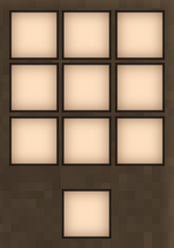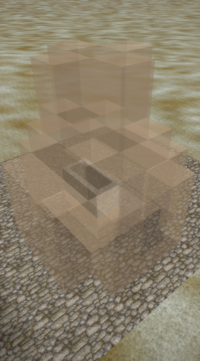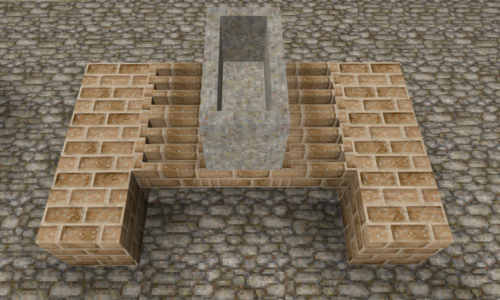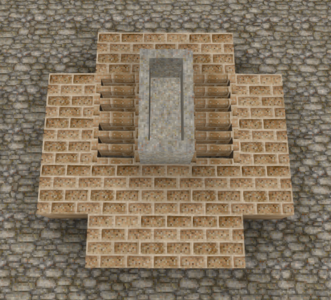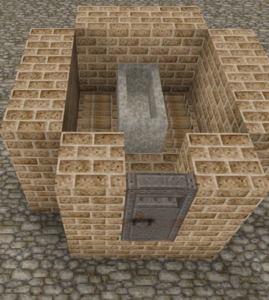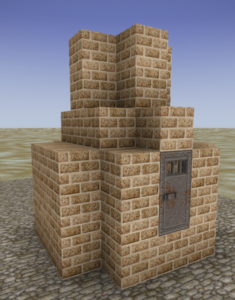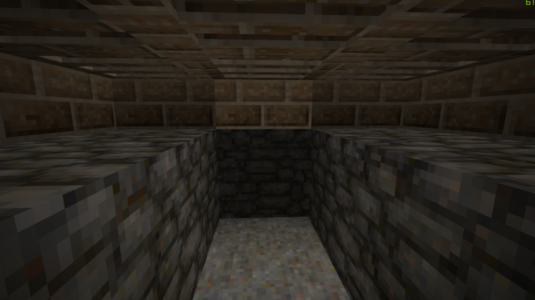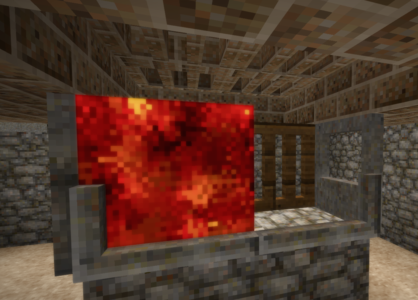Steel making
This page was last verified for Vintage Story version 1.19.3.
Steel making is the process of carbonizing iron under high temperatures, for which a new type of furnace building is required.
Required facilities
To produce steel, a player needs an iron anvil, a forge, and a refractory cementation furnace building, which itself will require a pulverizer.
Required materials
To build a functioning cementation furnace, the player needs:
- 1 iron door
- 2 stone coffin sections
- 2 stone coffin lids
- 6 refractory brick gratings
- 53 refractory brick blocks*
- a number of dirt or stone blocks to build the coal burning area beneath the furnace structure itself.
The minimum raw ingredients for these items are listed below.
- 6 iron plates (12 iron ingots)
- 8 whole granite, andesite, basalt or peridotite blocks
- 456 fireclay, which is about 8 stacks
- 29 mortar
- 228 of each powdered ingredient needed, depending on tier, which is about 4 stacks each
Creating refractory bricks
Refractory blocks are important for the steel making process as no other currently available block can withstand the extreme heat necessary to produce steel. Refractory blocks come in three different tiers, all of which can be used to make the cementation furnace. All refractory brick blocks have a chance to receive damage per use of the cementation furnace smelting process, however, using higher tier blocks will reduce the amount that receive damage per use:
- Tier 1: has a heat resistance of 90% (1 in 10 chance to break).
- Tier 2: 95% (1 in 20 chance to break)
- Tier 3: 99% (1 in 100 chance to break). (Tier 3 may actually have a heat resistance of 99.9% and thus a 1 in 1000 chance to break. This information needs verification.)
To produce refractory blocks, stone and ore types specified below need to be crushed in a pulverizer. These powders can then be used in the crafting grid together with fire clay to make unfired refractory bricks. Different compositions of powders are required for the different tiers.
| Material | Stone | Powder | Minimum pounder cap tier |
|---|---|---|---|
| Bauxite | 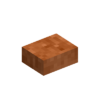 |
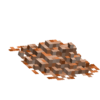 |
Bronze |
| Quartz | 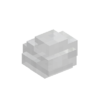 |
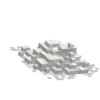 |
Bronze |
| Olivine | 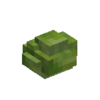 |
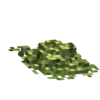 |
Iron |
| Ilmenite | 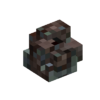 |
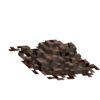 |
Steel |
Protip:
One chunk of poor or medium ilmenite creates one crushed ilmenite. Rich and bountiful create two. |
From tier 1 to tier 3, the recipes for raw refractory bricks are as follows:
| Ingredients | Crafting Recipe |
|---|---|
| 2x Fire clay 1x Crushed quartz 1x Crushed bauxite |
| Ingredients | Crafting Recipe |
|---|---|
| 2x Fire clay 1x Crushed quartz 1x Crushed bauxite 1x Crushed olivine |
| Ingredients | Crafting Recipe |
|---|---|
| 2x Fire clay 1x Crushed quartz 1x Crushed bauxite 1x Crushed olivine 1x Crushed ilmenite |
Raw refractory bricks need to be baked in a pit kiln to turn into fired refractory bricks.
Fired refractory bricks can then be used to craft their tier specific brick blocks and brick grating blocks. Here are the recipes for tier 1:
| Ingredients | Crafting Recipe |
|---|---|
| 8x Refractory brick (Tier 1) 1x Mortar |
| Ingredients | Crafting Recipe |
|---|---|
| 6x Refractory brick (Tier 1) 1x Mortar |
Building a cementation furnace
The cementation furnace is a multiblock structure that needs to be built in a specific way to ensure it is functioning as intended. When starting the build of a furnace, the player can use Shift + ![]() on the stone coffin with coal or an empty hand to trigger a building help overlay. Using Shift +
on the stone coffin with coal or an empty hand to trigger a building help overlay. Using Shift + ![]() will additionally inform the player about the number of still missing or mis-placed blocks in the structure. To deactivate this overlay, simply use
will additionally inform the player about the number of still missing or mis-placed blocks in the structure. To deactivate this overlay, simply use ![]() on the stone coffin.
on the stone coffin.
Protip:
The direction from where the player accesses the coffin while checking for the overlay will dictate the direction the building overlay is shown. The furnace will always assume that the coffin block the player hits when checking is the one nearest to the future furnace door - regardless if the player accesses from the side of the coffin or from the actual end of it. |
Other required blocks
Additionally to the refractory blocks, there are some more specialist blocks necessary to build a functioning steel making furnace, namely an iron door and a stone coffin including a coffin lid. And iron door can either be found in ruins, or crafted out of 6 iron plates. Stone coffins can be made out of granite, andesite, basalt or peridotite.
| Ingredients | Crafting Recipe |
|---|---|
| 6x Iron plate |
| Ingredients | Crafting Recipe |
|---|---|
| 1x Hammer 1x Chisel 1x Rock 1x Powdered borax |
The structure
- First, place the 6 grate blocks on the ground and the 2 coffin sections on them. These are the center blocks of the structure. The coffin sections will always be placed with the open side towards the player. As soon as the full coffin is placed - without coffin lid, for now - the player can use Shift +
 on the coffin to display the building help.
on the coffin to display the building help. - The full size of the furnace takes up a 5x5 space that is 6 blocks tall, however, an additional layer below the grates will be required to place fuel in.
- Raise the walls up by two blocks, and don't forget to place the iron door at some point in the process.
- Build up the roof, covering every open block with one above in a stair pattern. The finished furnace should have a 2 block high chimney as shown below. The chimney on top of the structure does not have to be open to the sky at the moment, but if it is blocked there will be no smoke indications shown while the furnace is running.
- The confusing part about building a cementation furnace is the space below the actual brick structure. For the process to work, the player needs to be able to access the two spots below the coffin placed on the grate blocks, as the steel making requires fuel layers to be placed on those two blocks. Due to the fact that coal will behave similar to snow if piled up to high, it is recommended to put stabilizing blocks to the side of the two open spaces for the coal. It is not required to close this space off airtight, the player can choose to leave a permanent hole or put in a coke oven door. Note that none of the refractory brick blocks can be removed to access this space, instead the opening needs to be created one block below the lowest brick layer.
- If the structure was build correctly, there will be no further indication of missing or misplaced block when using Shift +
 on the coffin.
on the coffin.
Creating blister steel
Blister steel is the first step of creating steel from iron, and functions the same way an iron bloom does. To heat iron up to the required temperatures to make carbonization possible, the player first needs to build a special furnace structure out of refractory blocks and other specialist blocks. Also, prepare a lot of charcoal, or collect a lot of black coal. One batch of steel will use 168 pieces of charcoal.
Smelting process
With a finished refractory furnace build, the next step requires the player to fill the coffin.
One stone coffin will hold a total of 16 iron ingots and 40 fuel pieces - either coke or charcoal. With the fuel in your active hand, target the inside the coffin and use Shift + ![]() to place one layer of fuel first, then one layer of iron ingots. Repeat until the coffin is full and will not accept any more items. The coffin should allow 5 layers of fuel with 8 pieces per layer, and 4 layers of iron ingots with 4 ingots per layer.
Once filled, the coffin tool tip will indicate that a coffin lid needs to be placed on top of the coffin. You can now place the 2 lid blocks. Note that the coffin needs to be filled completely, otherwise the process will not start even if the lid is placed and coal beneath ignited.
to place one layer of fuel first, then one layer of iron ingots. Repeat until the coffin is full and will not accept any more items. The coffin should allow 5 layers of fuel with 8 pieces per layer, and 4 layers of iron ingots with 4 ingots per layer.
Once filled, the coffin tool tip will indicate that a coffin lid needs to be placed on top of the coffin. You can now place the 2 lid blocks. Note that the coffin needs to be filled completely, otherwise the process will not start even if the lid is placed and coal beneath ignited.
After the coffin is closed, the player should leave the burning chamber and close the door. It is not recommended to enter the chamber again in the middle of the smelting process, as the extreme heat inside will cause 5 HP damage per tick if inside while the bricks are still heated. The coffin tool tip will indicate that the process requires fuel to be placed and ignited below the two grates under the coffin. Access the underbelly of the furnace as shown above from the side or the back of the furnace. Place fuel in equal amounts on the two spaces directly below the coffin. Each fuel layer on one block takes 2 fuel items, meaning a full layer on both blocks requires 4 fuel items. Charcoal, black coal, anthracite and coke work as possible fuel items.
After the carburation process is 100% completed, damaged refractory brick blocks can be broken to return some of their materials back, similar to a broken bloomery. Grate blocks do not get damaged at the moment, which means there is no sense in making them out of higher tier bricks. In addition, not all of the blocks on the cementation furnace building need to be of the same tier, allowing for use of refractory blocks of a different tier when replacing damaged ones.
When testing out the process in creative or survival, keep in mind that the coffin tooltip might take a few seconds to update correctly from one state to the next, specifically once the player ignites fuel below. The coffin will show the progress in percentages, but again it might take a tick until that progress info is shown correctly. A working furnace will have fire particles inside the burning chamber - which also indicates the danger of stepping inside at that time - as well as smoke rising from the chimney.
Protip:
The coffin will retain the progressed reached, even if the coal burns out before the process is finished! This allows the player to start the process with a low amount of fuel, and add further fuel as needed, or log off from a server without fear of loosing progress and materials. If using charcoal, exactly 5 full loads of 32 will be enough fuel for a full firing of blister steel ingots. |
One firing of 16 iron ingots will reward the player with an equal amount of blister steel ingots.
Making steel
Blister steel in itself is not yet workable steel, instead it behaves similar to iron blooms, and further refining is necessary. To turn blister steel into steel ingots, it needs to be processed on an iron anvil either by hand or with the help of a helve hammer.
Trivia
The design of the refractory furnace is a modified version of the Manuel de la métallurgie du Fer, from 1895 [1]
Video tutorials
| Detailed guide on what to get for steelmaking to start | Guide on how to build and use the furnace | German full Guide on how to make steel |
|---|---|---|
| Ores, metals and minerals | |
|---|---|
| Guides | Ore Deposits • Metals |
| Metals | Copper • Iron • Meteoric iron • Gold • Silver • Lead • Tin • Zinc • Bismuth • Titanium (Ilmenite) • Nickel |
| Alloys | Bronze (Tin bronze, bismuth bronze, black bronze) • Steel • Brass • Solder (Lead solder, Silver solder) • Molybdochalkos • Cupronickel • Electrum |
| Minerals | Alum • Borax • Cinnabar • Coal • Halite (Salt) • Lapis lazuli • Quartz • Saltpeter • Sulfur • Sylvite (Potash) |
| Tools | Pickaxe • Hammer • Prospecting Pick • Crucible • Forge • Ore blasting bomb • Quern • Anvil • Bloomery • Helve hammer • Pulverizer |
| Other | Gemstones |
| Related mechanics | Panning • Mining • Clay forming • Casting • Smithing • Steel making |
| Wiki Navigation | |
|---|---|
| Vintage Story | Guides • Frequently Asked Questions • Soundtrack • Versions • Controls |
| Game systems | Crafting • Knapping • Clay forming • Smithing • Cooking • Temperature • Hunger • Mining • Temporal stability • Mechanical power • Trading • Farming • Animal husbandry |
| World | World generation • Biomes • Weather • Temporal storms |
| Items | Tools • Weapons • Armor • Clothing • Bags • Materials • Food |
| Blocks | Terrain • Plants • Decorative • Lighting • Functional • Ore |
| Entities | Hostile entities • Animals • NPCs • Players |
| Miscellaneous | List of client commands • List of server commands • Creative Starter Guide • Bot System • WorldEdit • Cinematic Camera • Adjustable FPS Video Recording • ServerBlockTicking |
